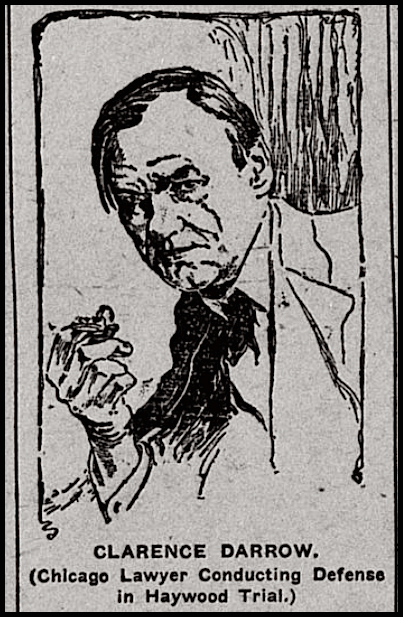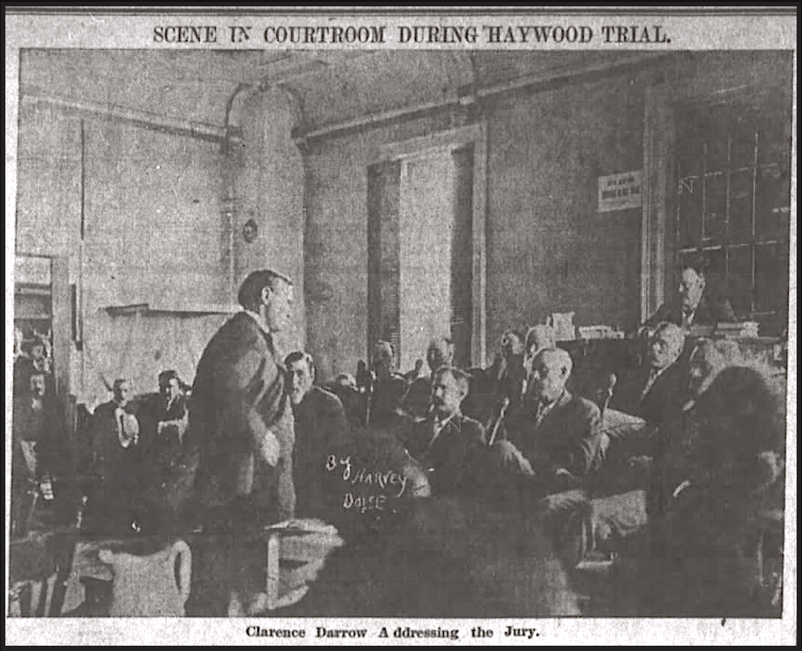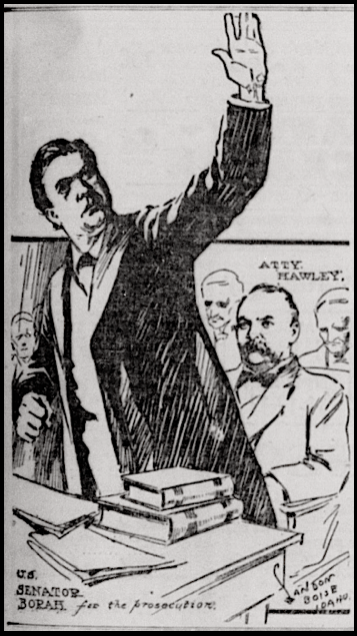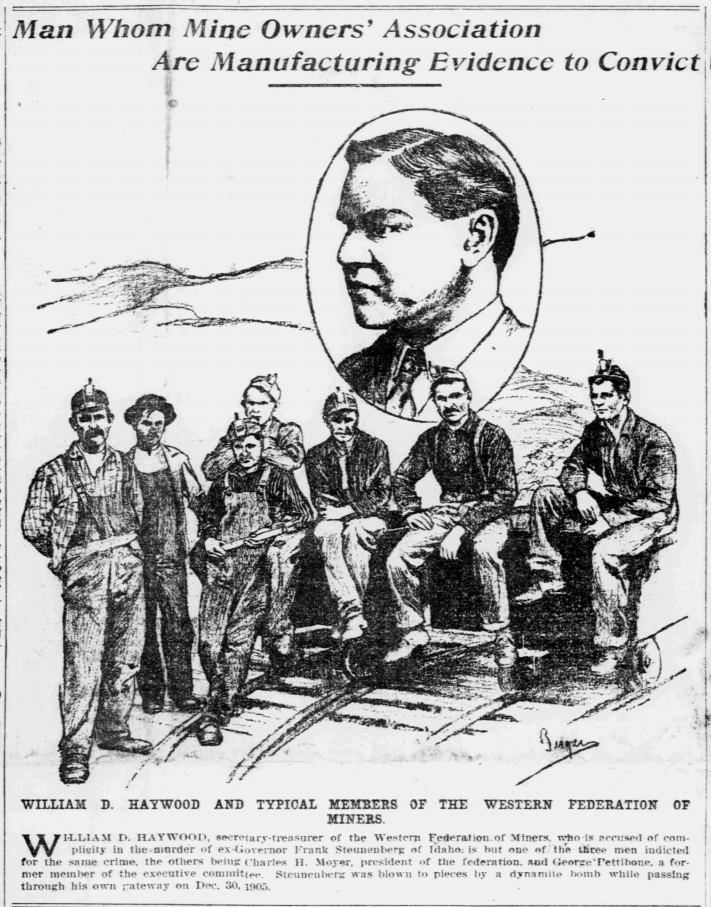I plead for the poor
and the weak and the weary.
-Clarence Darrow
~~~~~~~~~~~~~~~~~~~~~~~~~~~~~~~~~~~~~~~~~~~~~
Hellraisers Journal, Saturday July 27, 1907
Boise, Idaho – Darrow Pleads for Life of Big Bill Haywood

The defense placed the life of Big Bill Haywood in the hands of the jury as Clarence Darrow sat down next to the defendant at 4:20 p. m. on the afternoon of July 25th.
Having begun his closing argument on the evening of July 24th, Clarence Darrow continued the next day, speaking throughout the morning and afternoon sessions of the court. He concluded his address to the jury with an eloquent appeal for the life of William D. Haywood, Secretary-Treasurer of the Western Federation of Miners:
Mr. Hawley says that he believes in this case. I believe in it as I believe in my life. I’ve given 30 years of my life to the poor. I have pleaded cases for them, but never before have I pleaded a cause in which I felt such an interest, and never did I hope for a verdict in favor of my client as I hope for this….
But it is not for Bill Haywood I plead or for his widow or his orphans. If he dies 10,000 men who work in the mines will send their mite to support the widow and the little ones and a million people send their message of sympathy. I dont plead for Haywood. Don’t think for a moment that, if you kill Haywood, you will kill the labor movement of the world, or the hopes and aspirations of the poor. Haywood can die, if die he must, but there are others who will live if he dies, and they will come to take his place and carry the banner which he lets fall. I plead for the poor and the weak and the weary. The eyes of the world are on you 12 men of Idaho tonight, and wherever the English tongue is spoken and throughout the civilized world they are wondering about your verdict. If you decree his death the spiders and the vultures of Wall street will send up peans of praise and wherever men live who hate Haywood because he works for the poor you will receive your meed of praise.
But if you acquit this man there are millions of men-out on the broad prairies, on the wide ocean, in the factories and mills and down deep in the earth-there are-women and children who will pray for you. These men and women and children stand here with me tonight stretching out their hands and imploring God to guide your judgment and imploring you to save Haywood.
From the Deseret Evening News of July 25, 1907:
DARROW’S PLEA FOR HAYWOOD’S LIFE
—–
Was More Strictly Confined to a Review
of the Evidence in the Case.
—–DEFENDS SIMPKINS’ FLIGHT.
—–
Until Convicted, Every Member of
Western Federation of Miners
Will Stand by Him.
—–Eulogized Witnesses for the Defense,
All of Whom Are Brave Men,
Not Craven Cowards
—–
—–
Boise, July 25.-Final pleading for the acquittal of William D. Haywood was continued this morning by Clarence Darrow, who will conclude this afternoon. United States Senator Borah will begin the closing argument for the state at the evening session.
Mr. Darrow confined himself some what more closely today to a review of the evidence, but through the theme there continued unceasingly and almost to the point of monotony the strong note of abuse of Orchard and condemnation of the Pinkertons. Extreme hoarseness at first interfered somewhat with the speaker’s flights of oratory, but a liberal use of lozenges offered some relief and by the time Mr. Darrow reached the labor troubles in Colorado he threw all restraint aside and in spit of a reminder from the court, he rose to even greater heights than yesterday in his assault upon the existing order, past and present. He would speak, he said, on the subject of deportations and await the instruction of the jury later.
Mr. Darrow this morning defended the action of “Jack Simpkins” in disappearing. He argued to the jury that at the time of Steunenberg’s death no man accused of the murder would have been given a fair trial. He commended Simpkins for remaining in hiding during the present trial and brought bold accusation against the jury he was addressing when he said “Possibly a year hence every man who hasn’t been hanged can get a fair trial in Boise.” He explained the action of the Western Federation of Miners in reelecting Simpkins a member of the executive board, on the ground that as “brave men and brothers we should stand by him until he is tried and convicted.”
[…..]
WHY ADAMS NOT SUMMONED.
Mr. Darrow here went into a lengthy discussion as to why the defense had not put Steve Adams and George A. Pettibone on the stand. He demanded to know why the state had not put K. C. Sterling, the detective of the Mine Owners’ association on the stand. Adams, the attorney explained is on trial for the murder of a man in northern Idaho. Under these circumstances, Darrow said he would rather cut off his right arm than allow Adams to take the stand, much as he desired the acquittal of Haywood.
I am not afraid of what he would say against Haywood, but I am afraid to let Adams, my client, turn himself wrong side out under the cunning cross-examination of Senator Borah and then have his testimony used against him when the second trial for his life begins. No lawyer who would permit a client to do such a thing would be worthy of the name.
As to Pettibone, Darrow said the circumstances were much the same. He is to be tried for his life for the murder of Gov. Steunenberg. Pettibone was described as an easy-going, big-hearted fellow who had allowed the creature Orchard to worm his way into his house. It was more important for Pettibone to wait and take the stand in his own behalf, than to lay himself upon in the trial of Haywood, much as Pettibone would have like to testify for the prisoner now at the bar.
The reason the defense put Moyer on the stand, while he too is awaiting trial, Mr. Darrow said, is that there is no evidence of any sort for Moyer to explain. He expressed the belief that Moyer never would be tried for he did not believe that a prosecution even so foolish as the one against Haywood would dare put a man on trial with such flimsy evidence as could be entered against Moyer.
Mr. Darrow demanded to know why Detectives McParland and Sterling were not indicted, saying that to the latter especially had been brought home some of the most serious things in the case. He said he referred to the Independence depot explosion which he charged up directly to the Mine Owners’ association.
I don’t believe they intended to kill 14 men or any men, but they wanted to put up a job as they did in the train-wrecking case so that they might take the law in their own hands and drive out the Western Federation of Miners and all the men, women and children in the district who dared to sympathize with them.
Mr. Darrow picked out the story told by Orchard as to the plans for kidnapping August Paulsen’s children.
He says Dave Coates suggested it. Oh, yes, somebody was always suggesting these things to Orchard. He never did a criminal act of his own volition in his life. But if you men can find a way to believe Orchard in preference to Dave Coates I don’t know how you can ever make peace with your conscience or your Maker. And if you can find no way of believing Orchard in this instance, you must know he has been lying and lying since his conversion.
Plunging vigorously into the Cripple Creek troubles, Mr. Darrow declared that
when some day the people get the right angle on this case and look back upon the Colorado labor struggle they will have read on of the most important and pregnant chapters in the history of the United States.
[He exclaimed:]
Talk about law and order, nowhere in all the world has law and order ever been trampled in the dust as it was at Cripple Creek by the Mine Owners’ association and their cohorts, the respectables-merchants, bankers and the like-and the disreputable-the gun men.
EULOGIZED DEFENSE’S WITNESSES.
Darrow eulogized all the witnesses introduced by the defense. He said they had all been called murderers, perjurers and assassins by Hawley, but they were all brave men, not sneaking, craven cowards who would tie a bomb to a man’s front door and sneak off into the night. No, they stood in the open and fought fairly when they did fight.
Darrow dwelt for the last hour of the morning session upon the Bradley explosion in San Francisco. He declared all the evidence pointed to a gas explosion and described the testimony in support of Orchard’s story as to the bomb, “manufactured in Pinkerton McParland’s perjury factory.” The attorney asserted that it was impossible for Orchard to have gained the roof of the Bradley apartment house except by climbing the gutter pipe.
[He went on:]
And you don’t catch Orchard climbing any pipes. Oh, no; no chance like that for Harry. He might fall down and hurt his finger-and if he hurt his finger he might not be able to play on the harp in kingdom come.
Haywood trial took recess at noon until 2 p. m. Clarence Darrow concludes at the afternoon session.
———-
[Drawing and photograph added.]
From the Deseret Evening News of July 26, 1907:
DARROW FOR W. D. HAYWOOD
—–
Asks Mercy and Justice for Defendant,
and Pleads for the Poor,
Weak and Weary.
—–SENATOR BORAH FOLLOWS.
—–
Prosecution Makes No War on Organized Labor,
but There in Interest of
Law and Justice.
—–
Boise, July 25.-The case of the state of Idaho against William D. Haywood, Charged with the murder of Frank Steunenberg, of former governor of the state, will rest with judge and jury tomorrow night.
Clarence Darrow, after speaking for 11 hours, concluded the final plea for Haywood’s life at 4:20 p. m. and at 7 o’clock this evening United States Senator Borah opened the closing argument for the prosecution. He will speak for three sessions, or about seven hours. Judge Fremont Wood will instruct and charge the jury on Saturday morning.
At least 1,000 people were unable to find seats in the courtroom tonight. Two hours before the hour set for the third session of the day, crowds began to arrive and within half an hour the doors were closed to all but court officials and newspaper men. It was an audience composed almost entirely of Boise people gathered to hear the speech of the young man who, recently elected by the people of Idaho to represent them in the United States senate, has been the assistant counsel for the prosecution in the case against Haywood…
Senator Borah’s speech was a sensation. From time to time he turned on counsel for the defense, fierce denunciation pouring from his lips, and at times brought protest from Richardson and Darrow; but with blazing eyes and hot retorts, he silenced every effort to break the rush of words. The climax was reached when, in behalf of the state of Idaho, its people, its governor, and himself, he disclaimed all intention or desire to give immunity to Orchard. Finally, his face pale, and every muscle quivering with emotion, the senator raised his arm and said: “If I should ever join in or give approval to immunity to this man I hope the great God may wither my right arm to the socket.”
DARROW’S FINAL ARGUMENT.
Clarence Darrow continued his final argument at 2 o’clock. He took up the alleged attempts to assassinate Peabody, Goddard and Gabbert in Denver, and announced that he would devote most of the afternoon to the assassination of Steunenberg.
Before passing form the Colorado troubles in which the federation was involved, Atty. Darrow accused Gov. Peabody of trying to murder Moyer, Sherman Bell of having tried to assassinate him, and the Mine Owners’ association of having had him arrested on false charges. As opportunity offered, the attorney continued to inveigh against the newspapers and “the capitalistic class.”
Leaving Denver with Orchard, Darrow followed him through Idaho, up to Portland and Seattle and back to the Coeur d’Alenes in 1905. Here at Wallace, Darrow again argued the inspiration of the motive for the killing of Steunenberg, in the finding of all his old partners in the Hercules mine rich, while Orchard himself was poor.
Ignoring entirely the argument of Richardson that Orchard was in the employ of the Pinkertons, at the time he killed Steunenberg, Darrow asserted that the position of the defense was that Orchard’s sole motive for the murder of Steunenberg was to pay off the old grudge and revenge for having been driven out of the Coeur D’Alenes, and the loss of the opportunity to get rich like his old partners.
Running rapidly through the list of witnesses who have testified to threats made by Orchard against Steunenberg. Darrow had a good word to say for each, and argued their credibility as against Orchard. Gen. Engley of Colorado, a former attorney-general, afforded an opportunity for an eulogy of the former Gov. Waite, who Darrow said, would be revered by tens and hundreds of thousands of people throughout this country for the noble stand he took in the cause of labor.
[Darrow continued:]
And so this man, filled with hatred, went down to Caldwell to kill Steunenberg, whom he hated, and he borrowed the money from his old partner, Paulsen, in order that he might be able to do the deed. Jack Simpkins was at Caldwell, too, and he went from there to Spokane and then to Denver. He traveled on Orchard’s ticket. I promised to prove this to you, but I haven’t done so. I am not permitted to tell you why but I may say that one of our witnesses was killed in the night time at Denver when he was starting recently for Boise to testify on this subject.
Darrow admitted that the letter written by Pettibone to Orchard and received by Orchard after his arrest, in which Pettibone said that $100 had been sent to Simpkins by Haywood, was a suspicious circumstance, but not incriminating. In any event, he said that outside of Orchard, there was no direct evidence to show that Pettibone sent the letter.
The letter from Haywood to Mrs. Orchard and the sending of money by Pettibone to Orchard in San Francisco, Darrow said, were perfectly legitimate transactions. This evidence, he said, like all the other evidence brought by the state, failed utterly to incriminate his client.
At five minutes after 4 o’clock, after having spoken altogether for nearly 11 hours. Darrow reached the peroration.
[He said:]
I lack the voice and the strength, to discuss with you the many things I would like to call to your attention.
He paid a tribute to Senator Borah as the able counsel who would follow and plead for law and order and speak of the flag and the country.
NOTHING IN CASE BUT ORCHARD.
But I tell you, gentlemen, that there is nothing in this case but Orchard. I am confident that you will realize this and in this confidence I leave the case with you, and may peace be with you.
Mr. Hawley says that he believes in this case. I believe in it as I believe in my life. I’ve given 30 years of my life to the poor. I have pleaded cases for them, but never before have I pleaded a cause in which I felt such an interest, and never did I hope for a verdict in favor of my client as I hope for this.
Eloquently Darrow appealed for mercy and justice. He said he had known Haywood for years, and that the day of his conviction would be a sad day for him. The sun would not shine and the birds would not sing.
[He cried:]
But it is not for Bill Haywood I plead or for his widow or his orphans. If he dies 10,000 men who work in the mines will send their mite to support the widow and the little ones and a million people send their message of sympathy. I dont plead for Haywood. Don’t think for a moment that, if you kill Haywood, you will kill the labor movement of the world, or the hopes and aspirations of the poor. Haywood can die, if die he must, but there are others who will live if he dies, and they will come to take his place and carry the banner which he lets fall. I plead for the poor and the weak and the weary. The eyes of the world are on you 12 men of Idaho tonight, and wherever the English tongue is spoken and throughout the civilized world they are wondering about your verdict. If you decree his death the spiders and the vultures of Wall street will send up peans of praise and wherever men live who hate Haywood because he works for the poor you will receive your meed of praise.
But if you acquit this man there are millions of men-out on the broad prairies, on the wide ocean, in the factories and mills and down deep in the earth-there are-women and children who will pray for you. These men and women and children stand here with me tonight stretching out their hands and imploring God to guide your judgment and imploring you to save Haywood.
Mr. Darrow finished abruptly, and as he walked to his table plainly showed his emotion, and many women in the audience were in tears. Court immediately adjourned until 7 p. m., when Senator Borah commences his final argument for the state….
[Drawings added.]
SOURCE
Deseret Evening News
(Salt Lake City, Utah)
-July 25, 1907
https://www.newspapers.com/image/73738215/
-July 26, 1907
https://www.newspapers.com/image/73738282/
IMAGES
HMP, Clarence Darrow, Cresco IA Pln Dlr, July 2, 1907
http://chroniclingamerica.loc.gov/lccn/sn88059319/1907-07-02/ed-1/seq-4/
Darrow Addresses the Jury, OR Dly Jr, June 29, 1907
https://www.newspapers.com/image/79663289
HMP, Prosc Borah, Stt Str, July 26, 1907
http://chroniclingamerica.loc.gov/lccn/sn87093407/1907-07-26/ed-1/seq-1/
HMP, Haywood and Miners, Pensacola Jr, May 16, 1907
http://chroniclingamerica.loc.gov/lccn/sn87062268/1907-05-16/ed-1/seq-1/
See also:
Hellraisers Journal, Friday July 26, 1907
Boise, Idaho – Clarence Darrow for the Defense
Darrow for the Defense, Praises Western Federation, Denounces Orchard and McParland
The New York Times of July 26, 1907
http://query.nytimes.com/gst/abstract.html?res=9B00E7DE173EE033A25755C2A9619C946697D6CF&legacy=true
BORAH BEGINS LAST SPEECH AT BOISE
—–
Denies That State of Idaho Is Fighting
Organized Labor or the Poor.
—–DARROW CLOSES DEFENSE
—–
Tells the Jury That Entire World
Watches Them and Waits
for Their Verdict.
—–[by Oscar King Davis]
Special to The New York Times.
BOISE, July 25.-Senator Borah began his closing argument in the trial of W. D. Haywood, charged with the murder of ex-Gov. Steunenberg, at 7 o’clock this evening. Despite the heat, which rendered the place almost unbearably warm at this hour, the court room was crowded as it has not been before, even during the first days of Orchard’s testimony….
Darrow’s Closing
Darrow hammered away all day, on very much the same line that he took last night. It was ostensibly an examination of the testimony, interrupted at frequent intervals with digressions on non-resisting Socialism. The kind that never resists when its friends are beating up its enemies…
Emma F. Langdon’s book can be searched for more info on names and events mentioned above.
The Cripple Creek Strike by Emma F Langdon
-from Rebel Graphics (RIP FW Richard Myers)
Note: Links on the left can be used for more information on subjects mentioned above. Scroll down to Appendix for links to the Haywood-Moyer-Pettibone Case.
http://www.rebelgraphics.org/wfmhall/langdon00.html
See “Darrow Diamonds”
http://www.rebelgraphics.org/wfmhall/langdon33.html
The Cripple Creek Strike: A History of Industrial Wars in Colorado, 1903-4-5; Being a Complete and Concise History of the Efforts of Organized Capital to Crush Unionism
-by Emma Florence Langdon
Great Western Publishing Company, ab/ 1908
Note: this edition contains coverage of Haywood Trial, and was therefore published later than 1905.
(Use search feature for more info.)
https://books.google.com/books?id=olgpAAAAYAAJ



